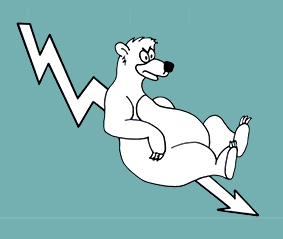First of all, let’s get the pronunciation out of the way; bear is pronounced /beə/, rhyming with “hair”. Don’t make the terrible mistake of saying “beer” /bɪə/ (which rhymes with “here”), nobody will be impressed.
So, what is this animal doing in financial markets? Well, A bear is an investor who’s downbeat about the economic situation, pessimistic about the market and so thinks that the value of an asset, or of the market as a whole, is going to decline.
Consequently, a bear market is a pessimistic market in which asset prices fall for a prolonged period of time – more technically, it’s when prices have fallen 20% or more after a recent peak.
“World markets are bearish due to the impact of the coronavirus and fell across the board in yesterday’s trading”.

“bear markets are usually characterised by investors arguing themselves out of buying. That’s why we always miss the bottom.”
Merryn Somerset Webb Financial Times March 13 2020
A popular saying is
“the best thing you can do in a bear market is play dead”
i.e. sit tight and wait for things to pass or maybe invest in liquid, short term instruments.
The adjective relating to bear is bearish
Japanese stocks are well placed to confound the sceptics. From coronavirus to corporate governance changes, foreign investors are too bearish
Financial Times February 11 2020
while the opposites to bears and bearish are bulls and bullish.

